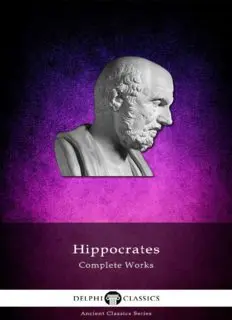Table Of ContentThe Complete Works of
HIPPOCRATES
(c. 460 – c. 370 BC)
Contents
Works of Hippocrates
ON ANCIENT MEDICINE
PROGNOSTICS
APHORISMS
EPIDEMICS I AND III
ON REGIMEN IN ACUTE DISEASES
ON AIRS, WATERS, AND PLACES
ON THE ARTICULATIONS
ON FRACTURES
ON THE INSTRUMENTS OF REDUCTION
ON INJURIES OF THE HEAD
THE HIPPOCRATIC OATH
THE LAW
THE PHYSICIAN’S ESTABLISHMENT
Works of the Hippocratic Corpus
ON THE NATURE OF MAN
REGIMEN IN HEALTH
ON ULCERS
ON FISTULAE
ON HEMORRHOIDS
ON THE SACRED DISEASE
ON ALIMENT
THE PRECEPTS
HUMOURS
DREAMS
THE ART
BREATHS
DECORUM
THE PHYSICIAN
DENTITION
The Greek Texts
LIST OF GREEK TEXTS
The Dual Texts
DUAL GREEK AND ENGLISH TEXTS
The Biographies
GENERAL INTRODUCTION TO HIPPOCRATES by W. H. S. Jones
HIPPOCRATES by Charles McRae
The Delphi Classics Catalogue
© Delphi Classics 2015
Version 1
The Complete Works of
HIPPOCRATES
By Delphi Classics, 2015
COPYRIGHT
Complete Works of Hippocrates
First published in the United Kingdom in 2015 by Delphi Classics.
© Delphi Classics, 2015.
All rights reserved. No part of this publication may be reproduced, stored in a retrieval system, or
transmitted, in any form or by any means, without the prior permission in writing of the publisher, nor be
otherwise circulated in any form other than that in which it is published.
Delphi Classics
is an imprint of
Delphi Publishing Ltd
Hastings, East Sussex
United Kingdom
Contact: [email protected]
www.delphiclassics.com
Works of Hippocrates
Harbour of Cos (ancient Kos) — Hippocrates’ birthplace
ON ANCIENT MEDICINE
OR, TRADITION IN MEDICINE
Translated by Charles Darwin Adams
This treatise is regarded as one of the most significant works of the Hippocratic
Corpus, the collection of approximately sixty writings covering all areas of
medical thought and practice, which are traditionally associated with
Hippocrates (c. 460 BC – c. 370 BC), the father of Western medicine. In more
recent times, thirteen of the works have been identified as being possibly by the
hand of Hippocrates, with On Ancient Medicine being a key text of this number.
The origins of the Hippocratic Corpus can be traced to the sixth and fifth
centuries BC in Italy.
There were two seminal schools of Western medical thought; Agrigentum on
the southern coast of Sicily and Croton on the west coast of the Gulf of Taranto.
Agrigentum was the home of Empedocles, while Croton belonged to the
Pythagorean sect of medical philosophy. The school of Agrigentum and
Empedocles placed great emphasis on cure by contraries, while the school of
Croton rejected this notion, championing the medical philosophy that perceived
the human organism consists of an infinite number of humours. The first medical
philosopher of the school of Croton was Alcmaeon, who argued that the
maintenance of good health required a balance of the powers of moist and dry,
cold and hot, bitter and sweet. He argued that sickness arises when there is an
imbalance within the human organism, caused by the predominance of one
power over another. In the Agrigentum school of thought Empedocles
hypothesised that the universe consisted of four elements: earth, water, air and
fire. On the basis of these four elements he sought to account for the origin of
matter. Matter or the universe was generated out of these four elements and their
mutual attraction and repulsion.
The conflict between these two schools of thought became manifest in their
medical philosophies. Whereas, Alcmaeon argued that there were indefinite
number of diverse qualities that made up the human organism, Empedocles
believed that there were four concrete or substantial elements. Although it is
Empedocles’ medical philosophy that ultimately inspires the humoral doctrine of
human nature, it is Alcmaeon’s theory that provides the backdrop to the medical
therapeutic doctrine proposed in On Ancient Medicine. Alcmaeon’s argument
that there are an infinite number of causes for disease that cannot be simply
organised into categories is the basic operating assumption of empirical
medicine. Therefore medical knowledge continuously expanded thorough a
firsthand experience and observation of the human organism within nature. It is
in this light that On Ancient Medicine should be seen as an attempt by
Alcmaeon’s followers and the empirical school of thought to respond to and
critique the Empedoclean or humoral theory of medicine.
On Ancient Medicine is formed of three parts. In chapters 1–19 the author
responds to the supporters of the hypothesis theory of medicine, arguing that the
exploration of medicine itself reveals the human organism as a blend of diverse
substances or humours. Having set forth this humoral theory, he then critiques
the hypothesis theory proposed by his opponents as being an oversimplified
conception of the cause of disease. He then discusses his own theory and method
employed in its discovery (chapters 20-24), before responding to the charge that
ancient medicine is not a genuine medical art because it has limited accuracy.
These arguments must be seen in the light of the author’s theory of human
physiology (chapters 9-12).
It is generally believed that On Ancient Medicine was written between 440
and 350 BC, with several hints suggesting a date in the late fifth century. In
particular, the author refers to Empedocles (490–430 B.C.) as the motivation of
the method he attacks, which would suggest a date not long after Empedocles’
peak of activity.
Since the work of Émile Littré in the nineteenth century, the treatise has been
scrutinised in thorough detail, in an attempt to determine which of the works in
the Hippocratic Corpus were composed by Hippocrates. Littré was the scholar
most associated with advocating that On Ancient Medicine was written by
Hippocrates, as he believed that it was the work to which Plato was referring to
in The Phaedrus. However, it is difficult to establish any certainty as to whether
the historical Hippocrates actually wrote the treatise On Ancient Medicine, due
to the scanty surviving evidence from references in Plato and Aristotle.
Vaticanus graecus 277, 10v-11r — a fourteenth century Hippocratic Corpus manuscript.

